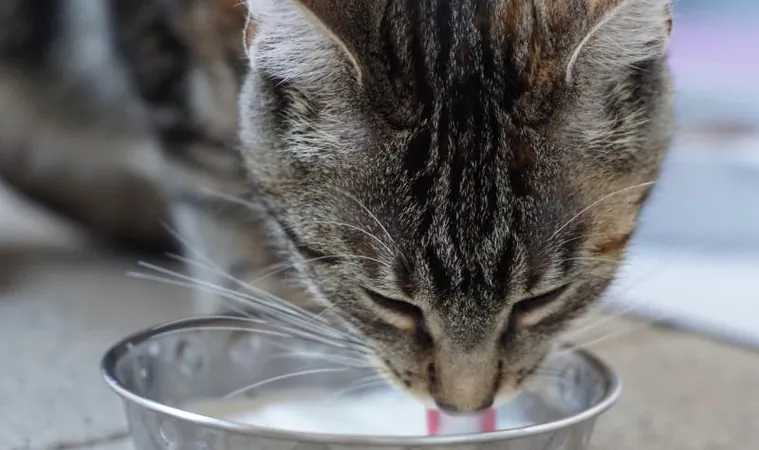
Outbreak Alert: Avian Flu Strikes Cats and Zoo Animals, Health Officials Warn of Growing Crisis!
2024-12-12
Author: Mei
A chilling incident has prompted urgent action from health officials as two pet cats in Los Angeles County are suspected of contracting avian flu after ingesting recalled raw milk.
This unsettling occurrence has raised alarms about the potential for broader animal infections, particularly following the distressing reports of infected zoo animals in Arizona's Maricopa County.
Cats Fall Ill After Consuming Contaminated Raw Milk
Today, Los Angeles County health authorities reported monitoring two cases of indoor cats that began exhibiting concerning symptoms after consuming milk from Raw Farms, which has been under recall due to health risks. These felines presented with signs including a loss of appetite, fever, and neurological symptoms before tragically succumbing to their illness.
Preliminary tests have indicated the presence of influenza A, a variant not commonly seen in cats, with officials suspecting it to be a case of the H5 avian flu strain.
Health officials stress that prior incidents involving dairy farms in the U.S. have shown that cats can become infected by consuming raw milk from cows affected by the flu. As a precaution, individuals who had close contact with the sick cats are currently being monitored and have been provided with antiviral prophylaxis.
With the recall of Raw Farms milk, health officials are urging both residents and their pets to avoid raw dairy and undercooked meats, exercise caution around sick or dead animals, and promptly report any unusual occurrences with birds.
Zoo Animals at Risk: A Cheetah and Mountain Lion Among Casualties
Meanwhile, in Arizona, the Wildlife World Zoo has reported that several animals, including a cheetah and a mountain lion, are among the casualties of a suspected avian flu outbreak. The state's Department of Agriculture has indicated that tests conducted revealed likely positive samples for the H5N1 strain.
Zoo management is collaborating with local and federal health authorities to identify personnel who may have been exposed to the affected animals, implementing rigorous monitoring protocols.
The zoo has swiftly isolated both infected and potentially exposed animals, bolstering its biosafety measures to prevent further spread. While some animals, like an infected white tiger, are reportedly showing signs of recovery, there is deep sadness as the zoo mourns the loss of creatures including a swamp hen, an Indian goose, and a kookaburra.
Kristy Hayden, the zoo's president, expressed sorrow over the loss but emphasized gratitude for the efforts made to contain the outbreak.
A Wider Crisis: Dairy and Poultry Under Siege
As the situation develops, the USDA has confirmed additional outbreaks in dairy cattle and poultry across several states. In California, a staggering 58 new detections have been reported, pushing the total number of infected cattle to 617.
This alarming increase has impacted almost half of California’s extensive dairy farms.
Furthermore, outbreaks in Iowa are particularly concerning, with two commercial farms experiencing significant infections of both turkeys and layers, totaling over 1.6 million birds combined.
Similar outbreaks have been reported in poultry farms in Oklahoma and South Dakota, with states like Louisiana and Missouri warning of a resurgence of avian flu in wild birds, exacerbated by the recent migratory season.
Residents are urged to keep their pets away from wild birds and to refrain from interacting with any sick or deceased birds in an effort to mitigate the flu's spread.
This emerging health crisis serves as a stark reminder of the interconnectedness of animal health and public safety, as health officials work tirelessly to control the outbreak and protect both pets and wildlife.




 Brasil (PT)
Brasil (PT)
 Canada (EN)
Canada (EN)
 Chile (ES)
Chile (ES)
 España (ES)
España (ES)
 France (FR)
France (FR)
 Hong Kong (EN)
Hong Kong (EN)
 Italia (IT)
Italia (IT)
 日本 (JA)
日本 (JA)
 Magyarország (HU)
Magyarország (HU)
 Norge (NO)
Norge (NO)
 Polska (PL)
Polska (PL)
 Schweiz (DE)
Schweiz (DE)
 Singapore (EN)
Singapore (EN)
 Sverige (SV)
Sverige (SV)
 Suomi (FI)
Suomi (FI)
 Türkiye (TR)
Türkiye (TR)